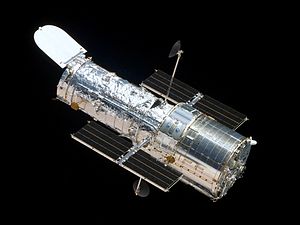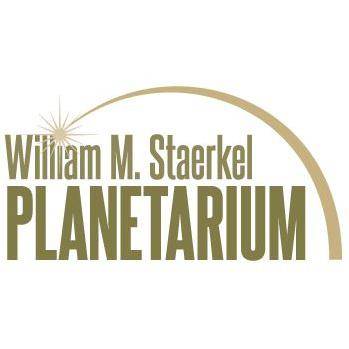I think I maybe just sorta learned everything about the universe, you guys. I went to the planetarium on Friday and it totally blew my freaking mind. First of all, it was only a dollar. The monthly “World of Science Lectures” at Parkland’s Staerkel Planetarium cost one measly dollar! They cover everything from fossil fuels to dark energy. And you can vote on the subject. The universe is in your hands, man!
The guest lecturer was Brian Fields, a cosmologist from the University of Illinois in the Astronomy and Physics Department. He is so funny, you guys, and not just for a scientist. He is a “card-carrying cosmologist,” which is a good field to go into because there’s so much we don’t know about the universe. “Talk about job security for life…”
Field’s humor-laced lecture was called “Our Accelerating Universe: Dark Energy and Antigravity.” I know what all of those words mean, but I had no idea what they meant together. I was on board. I had my paper and pencil at the ready.
The first thing I learned about our universe is that there is a goddamned black hole in the middle of our galaxy. Yeah. The one you’re in right now. He just threw that out there with the other bullet points and moved on like no one shat her pants. I didn’t even hear the next point because my brain was trying to scramble for meaning in that little tidbit of horrifying information. Maybe it’s no big deal when you’re a card-carrying science dude, but I was definitely a little rattled.
Once I regained focus, I heard people laughing. (Dr. Fields really is a funny guy.) He used a lot of analogies and sprinkled his PowerPoint with plenty of Simpsons clip art. He knew how to make this fascinating but overwhelming stuff accessible. He started from the beginning, with basic ideas and principles, and moved out to the more complicated notions.
 Edwin P. Hubble grew up and studied in Illinois and is probably the reason Dr. Fields has an income. Hubble measured galaxies. In 1929, he discovered that, the farther away a galaxy is from us, the faster it moves. Now, Einstein (Albert Einstein? You might have heard of him.) says that the universe is expanding. Those two guys, together, tell us that galaxies were closer together in the past and moving more slowly, and now they’re far away from each other and moving faster and faster.
Edwin P. Hubble grew up and studied in Illinois and is probably the reason Dr. Fields has an income. Hubble measured galaxies. In 1929, he discovered that, the farther away a galaxy is from us, the faster it moves. Now, Einstein (Albert Einstein? You might have heard of him.) says that the universe is expanding. Those two guys, together, tell us that galaxies were closer together in the past and moving more slowly, and now they’re far away from each other and moving faster and faster.
These galaxies were once compressed, meaning they were hotter. If you run the tape backward, all of the space shit gets closer and closer and hotter and hotter until it’s one burning point of energy. When you run that tape forward again, you see the Big Bang happening. Pretty awesome.
Cosmic archeology is one of coolest things I have ever heard of. For one dollar, I learned that The Hubble Telescope is an honest-to-goodness time machine. It captures light in “boring” areas of space, where not much seems to be going on. To give you a little background: when you look at the night sky, you’re seeing light that has traveled huge distances from stars that are now dead. They’re gone. You’re looking into the past. Scientists measure the time it takes for light from supernovae (dead stars) to get to The Hubble Telescope, and they are able to figure out how old that image is. They are literally capturing photos of the past and calculating the age of the universe.
I will give you a minute to absorb how unbelievably rad that is.
Now. I’m going to tell you something that may or may not give you a panic attack. Okay. Deep breath. Okay. The universe has dark energy in it, and no one knows much about it, and it increases all the time, and the whole universe is going to rip apart, and there is nothing we can do about it. It’s an explosion that will get faster and faster until every atom in the universe is obliterated. So don’t schedule any appointments for ten billion years from now. You won’t make them.
I find an odd comfort in the knowledge that everything is going to be obliterated, and there’s a sense of peace that comes with a complete lack of control. It really doesn’t matter if I have the best job or the smartest kids or the best personality. Sure, I make a bitchin’ Bloody Mary, but who cares? I could gain and lose everything I’ve ever worked for, but, in the end, the tiniest speck of every atom is going to be toast. The best and the worst people (if we haven’t wiped ourselves out by then) will get equal treatment in the cosmos. There is no discrimination in The Big Rip, and I like that.
Staerkel Planetarium has become one of my regular hangouts. I pay oh-so-few dollars to learn about the incredible world we’re living in, and it makes me sound like a smarty pants. Not that it matters. Ten billion years after I die, the tree I grow into will be obliterated by dark energy. Whoa.
—
Be sure to catch the next lecture (May 3), Understanding the Energy Challenge: It Takes More Than Science, where Professor of Physics Paul Debevec will explore solutions to the energy challenge.








